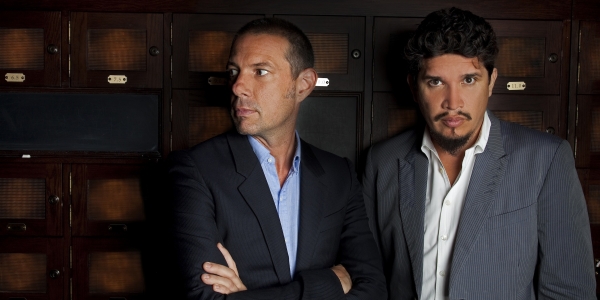Rob Garza and Eric Hilton formed the band in late 1995, self-signing to their own collaborative label as a response to the competitive ’90s music scene, and their anti-marketable, nu-underground aesthetic. “I think that Eighteenth Street has helped us get to where we are today,” Garza says. “We are independent artists and we have done this ourselves. If we were signed to a major label when we started, I can guarantee you we wouldn’t be where we are now. We went with Eighteenth Street because we didn’t know who we could get to put our music out – what we were doing wasn’t really part of a genre.” This independence effectively allowed the Washington DC-based duo to experiment and look forward, rather than simply respond to the expectations of a major label and mainstream audience. Collaborating with high profile artists like Emiliana Torrini and Wayne Coyne of The Flaming Lips didn’t hurt either. “I think that it has taken a while for us to reach that wider audience,” Garza says. “The audiences that we have played to here in America are bigger than ever [now]; it has taken people a while know what are doing. It’s been a slow burn – a long kind of trajectory that’s been great, and the fact that were here 16 years later making music when we have seen a lot of flavours of the month thrown aside, shows us that we’re still very lucky.”
Part of the reason it’s been important for Thievery Corporation to maintain their independence is the social messages that lie beneath the duo’s danceable psych grooves; messages that couldn’t be effectively communicated under the wrath of a major label. Such oblique political commentary was first seen on controversial Bossa Nova track Amerimacka off their 2005 release The Cosmic Game, a track which aimed to bring to light the corruption Thievery Corporation saw pervading USA governmental policies. Intense socio-political statements based around the ignorance of American societies, the perverse nature of the Iraq war, the economic crisis and the antics of George W. Bush have continued to feature within their body of work, but their sixth LP, 2008’s Radio Retaliation, was considered their most politically radical, showcasing their left-wing alliances through passionate, dogmatic lyrics.
But the pair’s talent is not limited solely to lyricism. They have always collaborated with a plethora of artists from a wide variety of styles and language backgrounds, demonstrating their phenomenal musicality as they have effortlessly explored a huge breadth of styles. It makes their live shows an unusual and interactive experience. “When we play live we have about five or six vocalists with us, and it’s great because you never kind of go to live shows where the music kind of changes in terms of genres and different singers and styles,” Garza says excitedly, “and so when we travel we have a drum section a percussion section and five or six singers, so it keeps it fresh”.
It’s this multi-dimensionality that makes Thievery Corporation’s art simultaneously rich in surface appeal but infused with layers – some of which can be too subtle to notice. “There are a lot of songs that people may be dancing to, but they might not really know what the song is talking about,” Rob Garza says. “There are messages that are happening within the music – for us its good to have the different levels and ideas. When it comes to political messages and social consciousness, music is the perfect vehicle for us to say what we want to say, and obviously we’re against things that are inhumane whether its corporations, war or government. Our music definitely allows us to speak our mind.”
You can hear them speak their mind late next month, when Thievery Corporation head to Australia to support the release of their seventh studio album, Culture Of Fear. Garza tells me that unlike the neo-political Radio Retaliation, Culture of Fear is based more around the music, with “beautiful, trippy 60s and 70s space rock influences”. With such a trail-blazing ability to keep their retro-sensibility alive and current within their music, don’t expect Thievery Corporation to go anywhere anytime soon.







